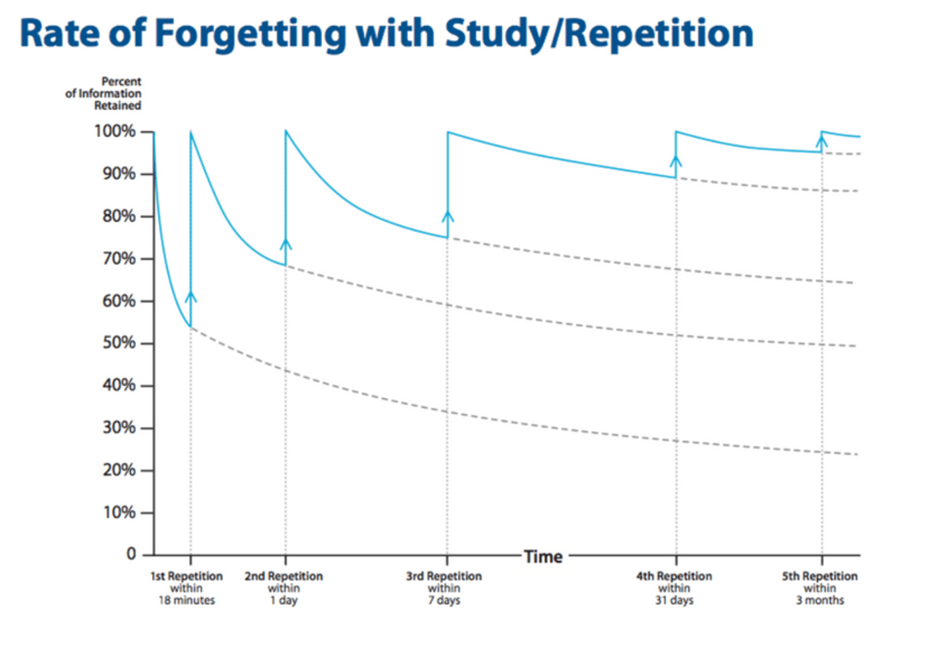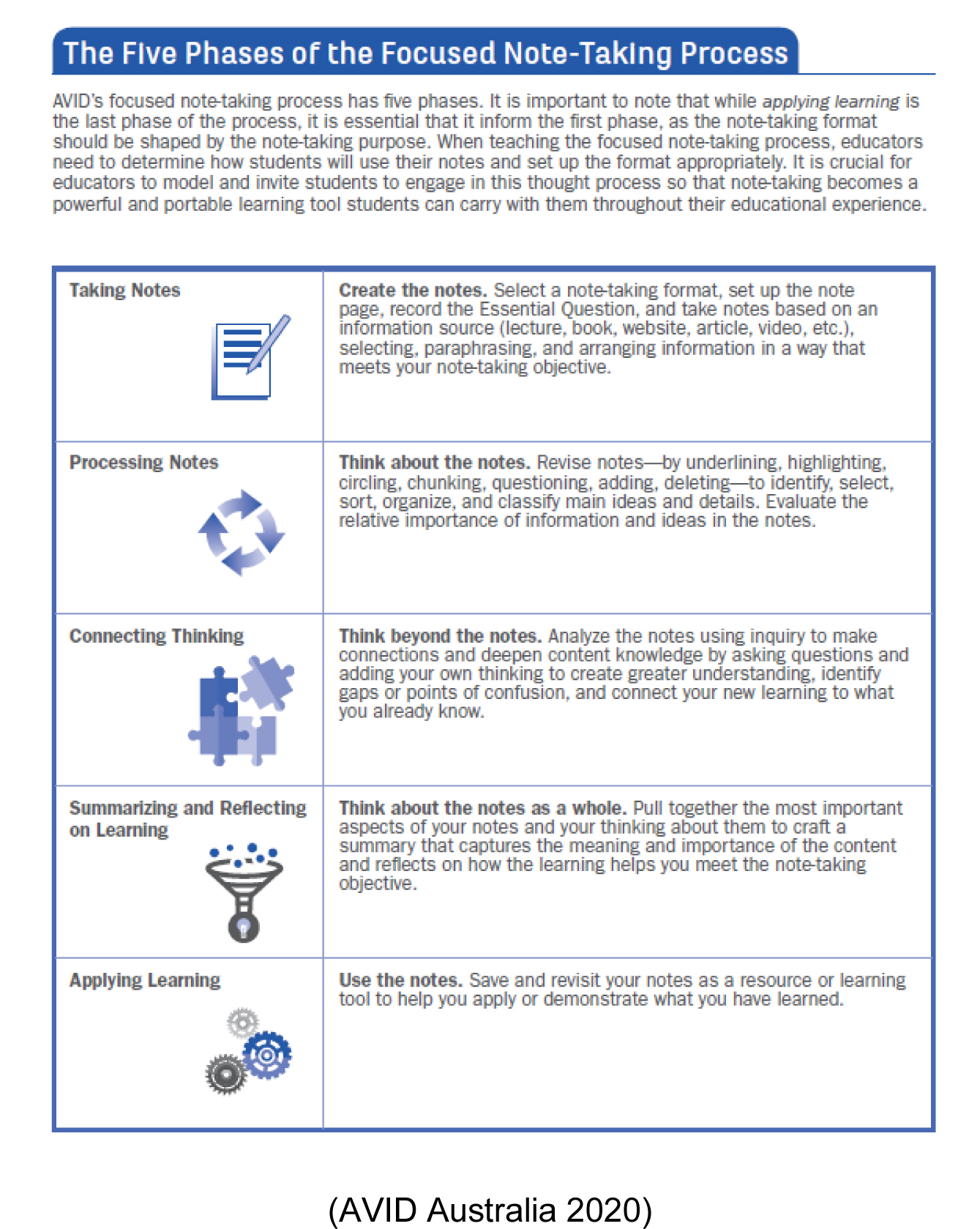HOME LEARNING
RATIONALE
As educators and learners, we know that there are some tasks that simply require practice, repetition, rehearsal and/or drafting in order to excel at them and as such, performing these tasks at home is of paramount importance to student success. Additionally, as our students advance from their education into their working lives, we also know that personal responsibility and effort are key drivers of being successful adults. Therefore, at Loganlea SHS, we believe that there are tasks our students can perform in order to gain maximum benefit from the learning experiences encountered throughout the day; namely rehearsing and revising their day’s work but also participating in the different phases of focused note-taking in order to challenge the Rate of Forgetting.
RATE OF FORGETTING
Hermann Ebbinghaus’ work on the Rate of Forgetting, which is reinforced by modern brain science, states that without adopting strategies to address our long-term memory, when we encounter new information, inevitably, we will forget a large portion of new knowledge input. It is imperative that on a number of occasions, we interact with new knowledge or our working memory is unable to retain information. Ebbinghaus’ study shows the rate of decline experienced when we as individuals are exposed to new information and do not process, summarise and reflect on our new knowledge. This underpins our focused note-taking pedagogy.

NON-NEGOTIABLES OF HOME LEARNING and FOCUSED NOTE-TAKING
Throughout the term, there will be times where teachers set home learning tasks in order for the learner to be ready for the next lesson’s learning and/or to be prepared and successful at upcoming assessment. In completing these preparatory tasks and organising themselves for drafts and assessments in a timely way, students can achieve the best academic outcome as a result of home learning.
Additionally, during classes, our students take focused notes that are centred around an Essential Question. They will have written cues (key words and questions of curiosity, fact and challenge) and notes— key information on the lesson’s content. As reflected in the image below, if we as learners wish to retain this new knowledge, we must process the notes. The attached handout Note Revision Checklist can aid your student in this task. They should highlight key words; use symbols to guide their thinking and revise and clarify their notes to reflect upon the information. During this phase of their note-taking, they are also connecting their thinking. For home learning, students might write: questions of challenge that indicate questions or gaps in their knowledge; question of curiosity— questions that pique their interest or connect to the real-world or another context; finally, questions of fact, where they question the details of their notes, such as key dates and names. In completing each of these tasks, students are not only challenging the Rate of Forgetting but deepening their knowledge and inquiry skills— all ever-important in the learning process. Another fundamental aspect to Focussed Note-taking is summarising what you have learnt in class. This involves writing three to four sentences that draw conclusions about learning; the Summary might answer the Essential Question or be an opportunity to set goals for future learning. Every lesson that uses focused note-taking should have a summary— particularly one that can be revisited to read and reflect upon in the future. In using these five phases of focused note-taking our students can be successful in their learning and use their notes as an invaluable tool to academic and life success.

HIGH EXPECTATIONS AND PLANNER USAGE
At Loganlea SHS we know the importance of both Organisation and having high expectations for our students, therefore, our teachers and management team monitor the use of the Student Planner for home learning and also discuss this at different intervals during the school year. The use of the planner places the emphasis on the student’s individual needs and values the knowledge that one of the greatest determinants of a student’s own success will be themselves. (Hattie: 2020) It is an expectation at our school that students use the Student Planner to record:
• Home learning tasks, including, drafting, rehearsing, class worksheets etc;
• The statement ‘Revise Focused Note-taking (FNT)’ if there is no other formal home
learning task required. This statement indicates that all activities listed in the
above section on Five Phases of Focused Note-taking are expected;
• Equipment and/or requirements for lessons so that the student is prepared for
class;
• The Essential Question for the lesson (for practical lessons) where focused
notetaking is impossible and
• Drafting and assessment dates.
In students recording all of the above in their planner, they can better achieve their goals as they are clear and logical. Further, parents can use this as an important resource to support students’ learning. Not only is it a port-of-call for our students, but it offers parents the opportunity to ask questions about your child’s learning and better understand the work that they are doing whilst in our care. Asking your child: How are you doing in your learning? How do you know? How can you improve? and How do you know it is working? are all questions that will deepen your child’s knowledge as being asked to articulate your learning is one of the best ways to cement the new knowledge and apply it in different settings.
SUPPORTING HOME LEARNING AT SCHOOL
We know that at times home learning can be daunting for both parents and students alike, so we have avenues in place that can support your child, including our Home Learning Hub where students can bring their home learning tasks and work with teachers and teachers’ aides in order to complete them. For more information on our Home Learning Club, please contact the school office.
Should you have any questions or comments about any of the above, please do not hesitate to contact Lauren Fletcher (Head of Teaching and Learning on
3451 8712 or lflet3@eq.edu.au.
FURTHER READING
AVID Australia (2020) AVID Tutor Training 2020, AVID Australia: Melbourne
Brown, C (2015) What’s the best, most effective way to take notes? Cited at:
Ebbinghaus, H (2018) Memory: A Contribution to Experimental Psychology, Scholar Select: USA